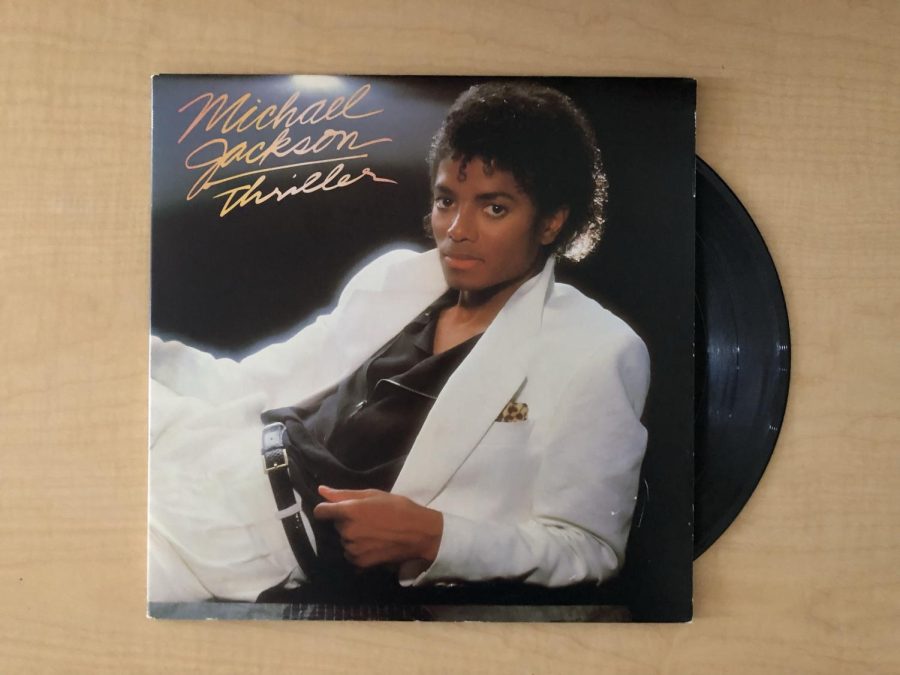In 1982, Michael Jackson transformed the music industry with his third studio album, “Thriller.”
“Thriller” was a blockbuster album. It was the best selling record for 37 weeks on the Billboard 200. All seven singles made it onto Billboard’s top ten songs chart. Today, the album has sold an estimated 67 million copies, making it the highest-sold album of all time.
The songs themselves are iconic. The spooky self-titled track “Thriller” still plays in Spirit Halloweens across the country. “Beat It,” featuring Eddie Van Halen, has one of the most iconic guitar riffs in pop music. “The Girl is Mine” helped bring two legends, Michael Jackson and Paul McCartney together on one track. “Billie Jean” is one of the smoothest R&B cuts from the 80s.
While these individual tracks and accolades are awe-inspiring, his music means even more for representation in popular culture. Michael Jackson didn’t just break musical barriers; he broke social and racial ones too.
Jackson’s sky-high success as a Black man in the music industry was largely unprecedented. While artists like Chuck Berry and Fats Domino laid the groundwork for popular music in the 50s and 60s, much of their work was covered by white artists to appeal to white audiences.
MTV was no different. According to San Diego State professor Maya Ginsberg, whose classes focus on Motown music and culture, the industry was unofficially divided by race.
“Prior to Michael Jackson, there were only a handful of Black artists [videos] being played,” Ginsberg said. “It wasn’t officially segregated, but it wasn’t integrated.”
His music video for the self-titled track, “Thriller” was a seminal moment in popular culture. The video was a high-budget endeavor, complete with zombies, fog machines, and Jackson’s iconic red jacket.
His work didn’t just change how the media represented Black musicians; he legitimized music videos as an expressive form of art. In fact, it was the first music video that was selected to the Library of Congress by the National Film Registry. MTV’s success further skyrocketed and so did Jackson’s.
“He really changed people’s entire approach to what a music video could be,” Ginsburg added. “They were not just people playing, but short films.”
“Thriller” made Michael Jackson the biggest artist in the world. It made him the “King of Pop.”
What makes an artist a king, is a kingdom of talented musicians who stand beside him.
One of the biggest names behind the recording booth was Quincy Jones. The beloved producer worked extensively with Jackson, as did the legendary Frank Sinatra. Jackson was also joined by his sister and vocalist Janet Jackson, bassist Louis Johnson, multiinstrumentalist James Ingram, and drummer Leon “Ndugu” Chancler. The background musicians’ efforts gave the album an incredible amount of cohesion from start to finish.
Ricky Pope, an assistant professor at the Office of Restorative Practices, believes that the contributors behind the scenes made just as much of an impact as Michael Jackson did.
“I think about what Michael was able to do about that in terms of giving [people behind the scenes] a stage. That’s a rich legacy and it’s such an opportunity for all the folks involved in that project,” Pope said. “As a culture we’re so interdependent. The album and how it lives on really captures that.”
“Thriller” and the rest of Jackson’s catalog have revolutionized and diversified popular music. Some of the biggest artists today — The Weeknd, Beyoncé and Bruno Mars have cited Jackson as an influence on their work. In the 2010s, five of the ten most streamed artists were non-white musicians. Black Producers such as Dr. Dre, Mike Will, and RZA have enjoyed significant critical and commercial success.
Racial barriers still exist in popular music today. In the aforementioned list of record sales, Jackson stands alone as the only Black male artist to crack the top 10. The only other Black artist on the list is Whitney Houston, for her work on the soundtrack for the 1992 film “The Bodyguard.”
Today, “Thriller” is a universally acclaimed 80s record and a Halloween staple. The songs are catchy, and Quincy Jones’s production is immaculate. But beyond the surface, this album means much more than that. 40 years after its release, it’s still relevant and sparks discussion.
“Thriller” is not an album you go back to, it’s an album that haunts you, in a good way.







